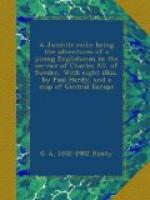Two days later, Count John Staroski started upon his return journey, much pleased with the reception he had met with from the King of Sweden, and determined to work vigorously, among the nobles of his acquaintance, to bring about the dethronement of Augustus of Saxony. Charlie had already seen Count Piper, who had told him that, although the king and himself were both well satisfied with the work he had done, there was not at present any mission of the same sort on which he could be employed. Indeed, it was evident that, until the Saxons had been decisively defeated, political action would be useless, and that, therefore, for the present he could either remain at headquarters, or rejoin his regiment. Charlie at once chose the latter alternative.
“Very well, Captain Carstairs, you can rejoin when you like, but remember I may claim your services again. You see, now that you have acquired a knowledge of Polish, your value for this sort of work is largely increased.”
As soon as the frost had broken, the Swedish army commenced its advance. Skirmishes frequently took place, but Augustus had, as yet, no army with which he could meet them in the field, and he summoned a diet at Warsaw, in hopes of persuading the Poles to decide upon calling out the whole national force.
In this he failed altogether. The citizens, led by the foreign traders, were already openly opposed to him, and their attitude so encouraged his opponents in the diet, that many of these rose and openly denounced the government, and the conduct of the king, that had brought the country into its present difficulties.
As the Swedish army advanced, they were joined by the Duke of Holstein, and, in spite of the efforts of a considerable body of the enemy, under Prince Wisniowiski, progressed steadily, crossed the river Memel, and, when near Grodno, were met by an embassy sent by the diet, to endeavour to persuade Charles not to advance further.
An interview took place between the king, the Poles, and his ministers, the conversation on both sides being in Latin. But as the ambassadors had no definite plans to propose, and their leaders were wholly devoted to Augustus, the king refused to allow his advance to be arrested, and continued his march. When near Praga they crossed the plain where Charles Gustavus, King of Sweden, had defeated the Polish army in a great battle, that had lasted for three days. The city was occupied, and a contribution of 20,000 crowns imposed upon it, in addition to food for the army while it remained there. Plundering, however, was strictly forbidden, and, as the king issued a proclamation declaring that he was no enemy of the Polish Republic, but simply of their king, the inhabitants were, on the whole, well satisfied with the conduct of the invaders.
A halt was made here for some time, and a bridge was thrown across the Vistula, while the army rested after the long and fatiguing marches it had made. A fresh attempt was made to arrest the advance of the Swedes, and the Cardinal Primate, himself, met the king; but nothing came of the negotiations, and the army entered Warsaw. Here they were warmly received, and great entertainments were given to the king.




